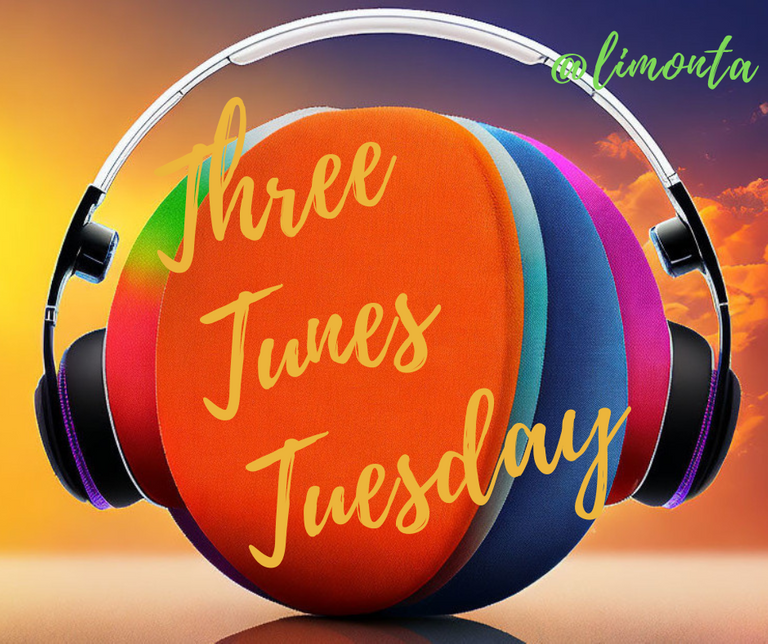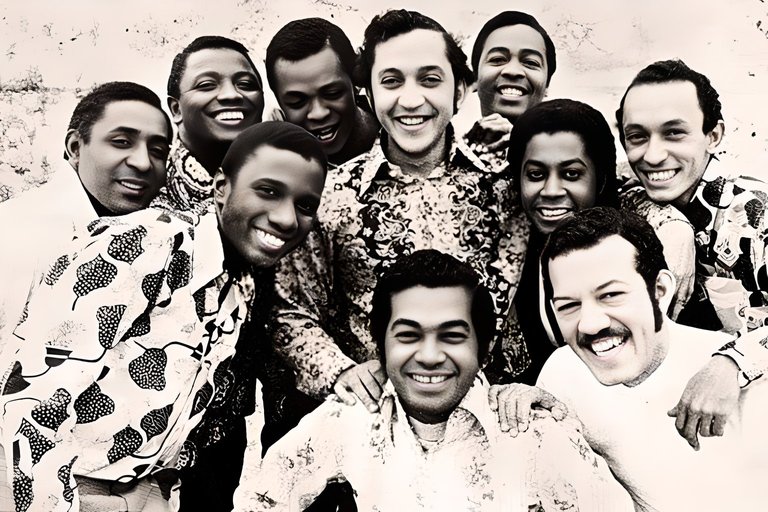Three Tunes Tuesday: Alexander Abreu, el músico cubano que sostiene la bandera (ES/EN)
 Original source (Edited with Canva).
Original source (Edited with Canva).Hola melómanos. El contexto actual de la música cubana no aporta muchas luces. No tributa casi nada nuevo al patrimonio sonoro de la nación. Nótese que hablo de obras o autores que puedan ser por lo menos evaluados para integrar el rico sanctasanctórum musical cubano, porque siempre se puede escribir alguna cosa sobre el pentagrama. Nos han pasado dos cosas. Se ha trivializado la escena musical con la irrupción de un género urbano que yo he defendido aquí—no lo censuro—, pero que carece de clase; musicalmente suele ser muy pobre. En las letras, se concentra en lo vulgar, las referencias explícitas al sexo, y la cosificación de la mujer.
Estoy lejos de ser un purista, pero como mínimo podemos reclamarle al movimiento urbano cubano que no se empantane allí, sino que exponga algo más de ese variopinto cuadro que es la sociedad, y particularmente la cubana. Nuestro rap, que alguien puede entender dentro de la música urbana, sí ha sabido hacer no solo crónica social—marcadamente contestaria—, sino también una crítica social profunda, defendiendo valores. En este sentido los exponentes del reguetón cubano están a años luz de sus colegas boricuas, por ejemplo, que sí han sido capaces de reflejar en sus textos todas las dimensiones de la sociedad.
Lo segundo que nos ha pasado es que la música que históricamente hemos conocido como "popular", ligada al son y otros ritmos autóctonos o sincréticos, también se ha devaluado. Entrecomillo el calificativo de popular porque se presuponía su jerarquía y preponderancia, pero eso está en discusión por el fenómeno arriba descrito. Lamentablemente, cuando revisamos su hora actual nos damos cuenta que todo tiempo pasado fue mejor, lo mismo en términos de cantidad de exponentes como de calidad. Grandes orquestas como Van Van, también víctimas de la dolorosa partida de monstruos insustituibles como Juan Formell, Adalberto Álvarez, o José Luis Cortés, no han sido capaces de mantener la dinámica que en su momento ellos sostuvieron, en la que cada nueva propuesta actualizaba el sello sin perder la esencia, siempre colocando el producto final en un nivel superior.
Hello music lovers. The current context of Cuban music does not shed much light. It contributes almost nothing new to the sound heritage of the nation. Note that I am talking about works or authors that can at least be evaluated to integrate the rich Cuban musical sanctum sanctorum, because there is always something that can be written on the pentagram. Two things have happened to us. The musical scene has been trivialized with the irruption of an urban genre that I have defended here—I don't censure it—, but that lacks class; musically it usually is very poor. In the lyrics, it concentrates on vulgarity, explicit references to sex, and the objectification of women.
I am far from being a purist, but at least we can claim to the Cuban urban movement not to get bogged down there, but to expose something more of that motley picture that is society, particularly the Cuban one. Our rap, which someone can understand within the urban music, has known how to make not only a social chronicle—markedly contesting—, but also deep social criticism, defending values. In this sense, Cuban reggaeton exponents are light years away from their Puerto Rican colleagues, who have been able to reflect in their texts all the dimensions of society.
The second thing that has happened to us is that the music we have historically known as "popular", linked to Cuban son and other autochthonous or syncretic rhythms, has also been devalued. I am using the qualifier popular because its hierarchy and preponderance were assumed, but that is under discussion due to the phenomenon described above. Unfortunately, when we review its present time, we realize that all past times were better, both in terms of quantity of exponents and quality. Great orchestras like "Van Van", also victims of the painful death of irreplaceable monsters like Juan Formell, Adalberto Álvarez, or José Luis Cortés, are unable to maintain the dynamics that they once sustained, in which each new proposal modernized the seal without losing the essence, always placing the final product at a higher level.
 The legendary Cuban orchestra "Los Van Van" has suffered the absence of its leader and founder Juan Formell. It has just released a new album, but the sound is in decline (source of the image).
The legendary Cuban orchestra "Los Van Van" has suffered the absence of its leader and founder Juan Formell. It has just released a new album, but the sound is in decline (source of the image).Havana D´Primera
Si hay un proyecto que ha logrado defender lo mejor de nuestra tradición, extrapolándola al siglo XXI al mismo tiempo que genera cosas orgánicamente nuevas y extraordinarias, es el dirigido por el jazzista Alexander Abreu. Lo presento como cultor del jazz intencionalmente, porque he dicho aquí otras veces que lo único que no ha dejado de "parir" Cuba en estos años son buenos jazzistas. Abreu es un heredero de los mejores momentos de la musica popular cubana en los 90, pero como trompetista también trabajó mucho con el maestro Chucho Valdés. La unión mayestática de esas dos venas nos regaló el nacimiento del grupo musical Havana D'Primera, en el que se atrevió a debutar como cantante ante el asombro e incluso la crítica de muchos.
Quien siempre tuvo claro que estábamos ante algo grande fue el mismísimo Formell, que lo bendijo y aupó desde el principio como lo mejor que se estaba haciendo en Cuba cuando no gozaba de la popularidad que tiene ahora. Alexander es tradicional y moderno, renovador, innovador, carismático, pero sobre todo ha tejido una obra a través de la cual uno puede explicar la Isla. Es un artista comprometido, que ha acompañado con su música esa eterna discusión sobre lo cubano, o lo que es ser cubano, desde una cosmovisión que no esconde en qué lado del espectro se sitúa, y que comparto a todo lo largo de la línea. De inmediato les propongo tres pistas de este artista cubano, a mi juicio el mejor embajador hoy de la música popular cubana.
If there is a project that has managed to defend the best of our tradition, extrapolating it to the 21st century while generating organically new and extraordinary things, it is the one led by jazzist Alexander Abreu. I present him as a jazz culturist intentionally, because I have said here other times that the only thing that Cuba has not ceased to "give birth" in these years are good jazz artists. Abreu is an heir to the best moments of Cuban popular music in the 90s, but as a trumpet player, he also worked a lot with the master Chucho Valdés. The special union of these two veins gave us the birth of the musical group Havana D'Primera, in which he dared to debut as a singer to the astonishment and even criticism of many.
Who was always clear of his singularity was Formell himself, who blessed him and promoted him from the beginning as the best thing that was being done in Cuba, when he did not enjoy the popularity he has now. Alexander is traditional and modern, a renovator, innovator, and charismatic, but above all he has woven a work through which one can explain the island. He is a committed artist, who has accompanied with his music that eternal discussion about what is Cuban, or what is being Cuban, from a worldview that does not hide on which side of the spectrum he is situated, and that I share all along the line. Today I let you with three tracks by this Cuban artist, in my opinion, the best ambassador of our popular music.
Raza
En esta presentación en directo podemos disfrutar uno de los temas seguramente antológicos de Abreu. Aquí apreciamos su talento como compositor, pero también cómo siente lo que está cantando. Hay un sentido identitario asociado con la oprobiosa esclavitud que vivió Cuba, y que quizás pocas veces se haya rechazado desde el arte musical de una manera más contundente que como lo hace Alexander aquí.
In the following live performance we can enjoy one of Abreu's surely anthological songs. Here we appreciate his talent as a composer, but also how he feels what he is singing. There is a sense of identity associated with the opprobrious slavery that Cuba lived through, and that perhaps has rarely been rejected in musical art in a more forceful way than Alexander does here.
Azowano
La herencia africana no solo nos dejó dolor y vergüenza, sino también toda una tradición espiritual que encuentra en la música su expresión más natural. El tema que sigue, dedicado a un santo del panteón de dioses africanos que aquí se venera—protector de los enfermos, sincretizado con el San Lázaro de la religión católica—, es realmente cautivador. Aquí Alexander lo nombra por el nombre que adopta en la tradición arará, proveniente del antiguo reino de Dahomey, hoy Benín, que por cierto, tiene una historia riquísima que invito a buscar.
The African heritage not only left us pain and shame but also a whole spiritual tradition that finds its most natural expression in music. The following theme, dedicated to a saint from the pantheon of African gods venerated here—protector of the sick, syncretized with the Saint Lazarus of the Catholic religion—, is truly captivating. Here Alexander names him by the name he adopts in the Arara tradition, coming from the ancient kingdom of Dahomey, today Benin, which, by the way, has a very rich history that I invite you to look up.
Mamaíta no quiere
Un tema que Abreu recupera de la obra que nos legó para siempre el inolvidable Adalberto Álvarez, puramente sonero, un extracto sonoro que trasciende como material de estudio de lo que musicalmente somos. La pista está incluida en el penúltimo álbum de Alexander, en el que rinde el mejor homenaje posible a lo que sucedió la última vez que se produjo aquí buena música bailable a destajo: la socialmente convulsa pero musicalmente extraordinaria década de los 90. Disfrútenla.
A track that Abreu recovers from the work that the unforgettable Adalberto Alvarez bequeathed us forever, purely sonero, a sound excerpt that transcends as study material of what we are musically. The track is included in Alexander's penultimate album, in which he pays the best possible tribute to what happened the last time good dance music was produced here by the bucketload: the socially convulsive but musically extraordinary decade of the 90s. Enjoy.
Y esto es todo por hoy amigos. Espero sus siempre bienvenidos comentarios sobre estas propuestas debajo. Que tengan una excelente jornada.
ADVERTENCIA: Los videos referidos no son de mi propiedad, solo comparto el enlace al video del propietario de los derechos de autor. No se pretende infringir los derechos de autor.
And that's all for today folks. I look forward to your always-welcome comments on these tunes below. Have a nice day.
DISCLAIMER: The linked videos are not owned by me, I am sharing just the link to the copyright owner's video. No copyright infringement is intended.

Edited with Canva.

Do you want to get involved? Do you want to support music and this project? Follow us to keep you updated and read our Introduction post!
🎶 Join us on our Discord Server! 🎵